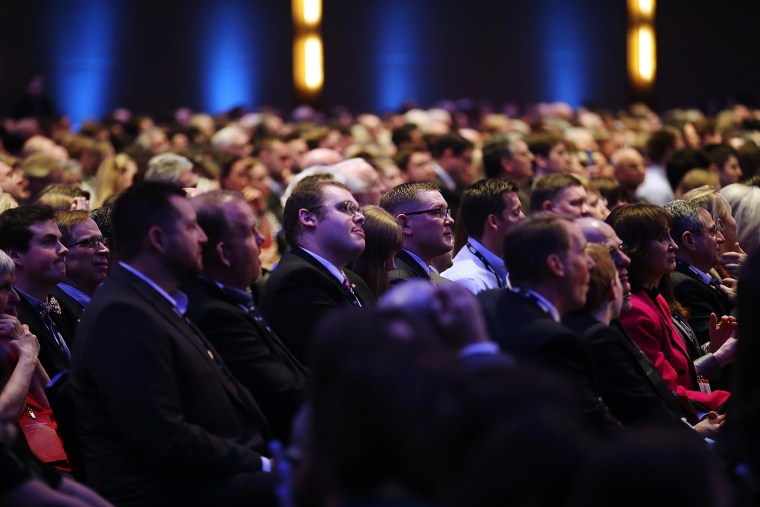Imagine a world in which Donald Trump never ran for president.
For a few brief stretches during Thursday’s GOP debate, which Trump boycotted over a feud with Fox News, it was almost possible to see it. The candidates were less combative early on, and there were longer and more substantive answers on policy, like Rand Paul discussing Ferguson and Jeb Bush talking about veterans' issues. There was a lot less spectacle and even fewer ad hominem attacks.
For candidates like Bush, whose debates have often been defined by confrontations with Trump, the front-runner’s absence allowed them to get their message out clearer and more confidently than ever before. In fact, with the exception of Dr. Ben Carson, almost everyone seemed to have more pep in his step than usual.
But, as we’ll explore below, the debate was still defined by the missing candidate in certain key ways.
There was no Trump pile-on ...
Trump’s absence presented a challenge to the candidates. Attack him while he’s not there, and you might look weak. Leave him alone, and you might miss the last chance to drag him down from his leading position in the polls before Monday’s caucus.
Candidates mostly decided on the latter option when confronted with questions about Trump at the beginning, cracking jokes but then mostly moving on.
“I’m a maniac and everyone on this stage is stupid, fat, and ugly, and Ben, you’re a terrible surgeon,” Ted Cruz said. “Now that we've gotten the Donald Trump portion out of the way…”
And that was it from Cruz, who has been attacking Trump relentlessly on the trail this week otherwise. The senator has to hope his own highlights and whatever backlash Trump gets for skipping out (if there is any) can reverse his polling slide. Cruz spokesman Rick Tyler told reporters afterward that Trump’s absence “spoke for itself.”
Jeb Bush joked he missed Trump, who “was a little teddy bear to me.” But rather than use that line to pivot to an attack on Trump, he instead chastised his rivals for not attacking Trump themselves. “Everyone else was in the witness protection program when I went after him,” he complained.
… but Trump never really left.
Washington Post reporter Ed O'Keefe asked Cruz after the debate if he missed having Trump around.
"He's always with us," Cruz responded.
One reason it was so hard to pretend Trump wasn’t in the room is that -- as becomes clearer every debate -- candidates have absorbed so many of his positions and rhetoric. Trump may have been gone, but Trumpism hung in the air.
The main fireworks were on immigration, a topic in which almost everyone on stage had at least flirted with more moderate views in a less heated time for the party. With the issue turbocharged by Trump, they now lobbed the toughest attacks of the night at each other over the issue, regardless of their current or former position.
RELATED: GOP hopefuls face toughest grilling on immigration yet
Bush, who supports a pathway to legal status for immigrants but whose super PAC is running ads attacking Rubio’s “amnesty” bill, squared off with Rubio, who was confronted by the moderators with clips of him pledging not to pursue a path to legal status as a Senate candidate.
“You used to support a path to citizenship,” Rubio shot at Bush.
“So did you!” Bush responded.
Paul, channeling Trump to denounce Rubio’s bill, said, “You can’t be in favor of defending us from radical Islam if you’re not in favor of border security.”
Ted Cruz, who avoided taking a position on legal status for undocumented immigrants for years, now boasted that his plan was “designed with Iowa’s own Congressman Steve King and Jeff Sessions,” the best known anti-immigration hardliners in Congress. It’s not at all clear this is what things would look like for him if Trump never ran.
The real fight is still below Trump
Part of the reason for the lack of attacks on Trump is due to a collective action problem. For nearly everyone running, the most important immediate goal is to knock off his or her most similar rivals before taking on the front-runner with a unified base. Only Cruz, who faces a mortal threat in Iowa from Trump, is urgently working to confront him now.
Bush was asked about this dynamic during the debate, specifically why the independent super PAC supporting him is spending tens of millions of dollars attacking Rubio.
“This is beanbag compared to what the Clinton hit machine is going to do to the Republican nominee,” Bush said.
As the lengthy immigration portion indicated, that meant candidates had plenty of reason to go after each other. After the moderators played video of Cruz explaining his amendment to strip a path to citizenship from Rubio’s bill but leave its legalization component in place, Rubio and Paul pounced.
“He's the king of saying ‘Oh, you’re for amnesty, everyone’s for amnesty except Ted Cruz,’ but it's a falseness, and that's an authenticity problem,” Paul said.
“This is the lie that Ted’s campaign is built on,” Rubio said, following up. “That he’s the most conservative guy and everyone else is a RINO. The truth is throughout this campaign, Ted, you’ve been willing to do anything or say anything to get votes.”
That left an opening for Christie, who argued the debate over esoteric amendments and failed legislation indicted all the senators onstage.
“Stop the Washington bull and let's get things done!” he said.
In general, the debate was less combative than the last one in South Carolina, which was one of the most contentious of the campaign. But the infighting benefits Trump, and the battles were largely fought on his territory.
